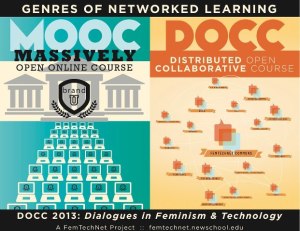Evolution of the MOOCs?
By Alexandra Juhasz, Pitzer College
I am recently returned from the 9th Annual Policy Summit, Rise of the MOOCs: Foreshadowing the Coming Transformation of Higher Education? held by the Mid-West Higher Education Compact. While I have become a frequent public speaker, most recently asked to explain my several innovative projects within technology and education (like FemTechNet), I have never had the opportunity to speak and listen to this particular, and highly engaged, audience.
I was pleased, albeit a bit intimidated, to be speaking in Omaha, Nebraska, on behalf of FemTechNet and our DOCC2013, a collaborative feminist rethinking of the MOOC, in this decidedly red-state environment, and to a large number of powerful people who are seriously considering the many ramifications of Open, Free, and otherwise digital education initiatives in relation to policy and Higher Education. Yes, people in this audience in a great many ways have more power than do I over what will happen to MOOCs evolution, rise, or decline in that they are in control of purse strings, policy, and large institutions.
I was placed on an elegantly-curated panel of fellow professors (Bryan Alexander, from NITLE, Ronald Rogers, San Jose State, who has authored two really interesting MOOCs, and Ray Schroeder, a specialist on online learning) who are each thinking critically, seriously, and actively about the huge ramifications of these many technological changes.
While I learned a great deal at the Summit, let me briefly point to a few of the most important things that I heard several times over, which all point to why I titled this post, “Evolution of the MOOCs”: they are being challenged from many angles; they are being changed and modified by many of us; and, whether our concern is cost, access, ownership, content, structure, or completion rates, people want MOOCs to develop past this first consolidation. It is my sense from this and some other recent conversations, that a great many of us who are wanting to use technology to improve Higher Education share concerns about:
• the current MOOC-osphere, where for-profit or other highly-funded models are dominating the landscape
• and leading to top-down, static, one-way delivery flows that are surprisingly ill-suited for their web 2.0 home
• teachers not driving teaching and learning and teachers not retaining control of their intellectual property (even if this is to let it be free through a Creative Commons license)
• learning systems that subscribe to the limiting terms behind the MOOC. What would digital class delivery look like that was Local, Closed, Hybrid, and/or Modular (this is from Stacey Clawson from the Gates Foundation).
• The quick loss of the cMOOC (which was Open) for our current xMOOC (“broadcast, amplified, online learning”; this is from Bill Meinke from Creative Commons)
• that like anything else on the Internet, expanding access to courses or free education is only a first step; students and professors need support structures not just (free) platforms (Mark Johnson, Educational Policy Studies, U WI)
• that professors will always be needed to create (new) content (knowledge); why are we handing delivery (profit and ownership) over to someone else?
• that MOOCs not be only huge, expensive, and fancy things but rather, that little pieces of MOOCs, as modules, might allow for all kinds of usability within any particular (for-credit) class; that pieces of (free) MOOCs can also be well-used to flip traditional classrooms
